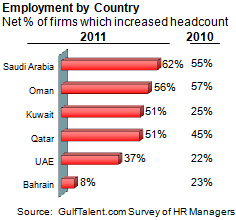Saudi Arabia, Qatar and Oman are the leading job creators in the Gulf Cooperation Council (GCC)
Oil and gas, healthcare and retail sectors are enjoying the largest headcount expansion
Western expatriates easier to recruit as a result of global economic woes
Dubai strengthens position as most preferred expatriate destination
The Gulf region continues to create jobs despite the impact of the Arab Spring in 2011, according to a survey by GulfTalent.com.
The 2012 edition of "Employment and Salary Trends in the Gulf" released today by GulfTalent.com shows that Saudi Arabia is the leader in job creation, thanks to its strong economic growth and massive government investment. Some 62% of firms increased their headcount last year compared with 55% in 2010, the survey shows. Next was Oman, where 56% of firms created new jobs, 1% down on the previous year.
Qatar also saw 51% of employers creating new jobs, reflecting the continued strength of the Qatari economy. In Kuwait, the percentage of firms that created new jobs in 2011 more than doubled compared to 2010, rising by 26% to reach 51%. Over the same period, the UAE also saw the number of firms creating new jobs jump by 15% to reach 37%. [See full report ]

The GulfTalent.com survey also revealed that Dubai’s share of regional recruitment activity has started to increase after two years of slowdown, due to a combination of jobs growth and churn.
In Bahrain, however, severe political tensions continue to negatively impact the job market. According to GulfTalent.com, only 8% of firms reported any new jobs being created last year, down from 23% in 2010.
The survey highlights that the oil and gas, healthcare and retail sectors are enjoying the largest headcount expansion, while banking and construction fare the worst.
UAE and Qatar remain prime destinations for expats
GulfTalent.com’s survey shows that the UAE and Qatar remain prime destinations for expatriates, with Saudi Arabia in third place. According to the survey findings, the UAE strengthened its position as the most popular destination among Gulf-based expatriates, with Dubai overwhelmingly remaining the most attractive city.
Qatar remained in second place in terms of popularity with expatriates. Hit by domestic unrest, Bahrain dropped from 4th place to become the Gulf’s least attractive destination for expatriates in 2011, behind Kuwait and Oman.
The study also shows that, as a result of Western countries facing high unemployment and low pay rises, employers in the Gulf are finding it easier to hire Western nationals rather than Asian candidates. However, according to interview findings, some employers are facing difficulty attracting Western candidates because they perceive the region to be unsafe, following widespread media coverage of the Arab Spring.
This year’s survey also highlights the fact that governments across the region are making the nationalisation of expatriate jobs a top priority and are embracing various schemes to do this. The survey noted that more innovative approaches are now being tried in some Gulf countries, introducing elements of choice, competition and commercial incentive.
Salaries remain stable - modest increase expected in 2012
Across the GCC, average private sector salary increase has remained stable but much lower than pre-recession levels, according to GulfTalent.com. Oman saw the highest salary increase in 2011 (6.5%) prompted in part by widespread strikes by Omani nationals and a pay hike awarded by the government to public sector employees. Saudi Arabia and Qatar saw increases of 6.0% and 5.6% respectively on the back of strong economic developments. The UAE experienced an average increase of 4.9%, while Bahrain had the region’s lowest salary increase, of only 4.5%.
However, real salary increases, consisting of average pay rise net of inflation, was highest in the UAE and Bahrain. In real terms, Saudi Arabia and Kuwait had the lowest salary increases.
Among job categories, human resource professionals enjoyed the highest pay rise, while administration and marketing were the lowest. Among sectors, healthcare and retail offered the highest pay rises, while real estate had the lowest.
In 2012, Gulf employers expect similar salary increases to last year, with Qatar leading the way.
GulfTalent.com’s research study was based on:
An online survey of candidates: 35,000 professionals aged between 22 to 60 years and earning annual incomes in the range USD 12,000 to USD 200,000
An online survey of employers: 2,100 employers based across the Gulf, employing between 50 and 20,000 employees each
Interviews with top managers: 60 executives and HR managers in the GCC across all industries
News and research: From press and macro-economic sources
The full research report "Employment and Salary Trends in the Gulf 2012" is available for download from GulfTalent.com website free of charge. [See full report ]
